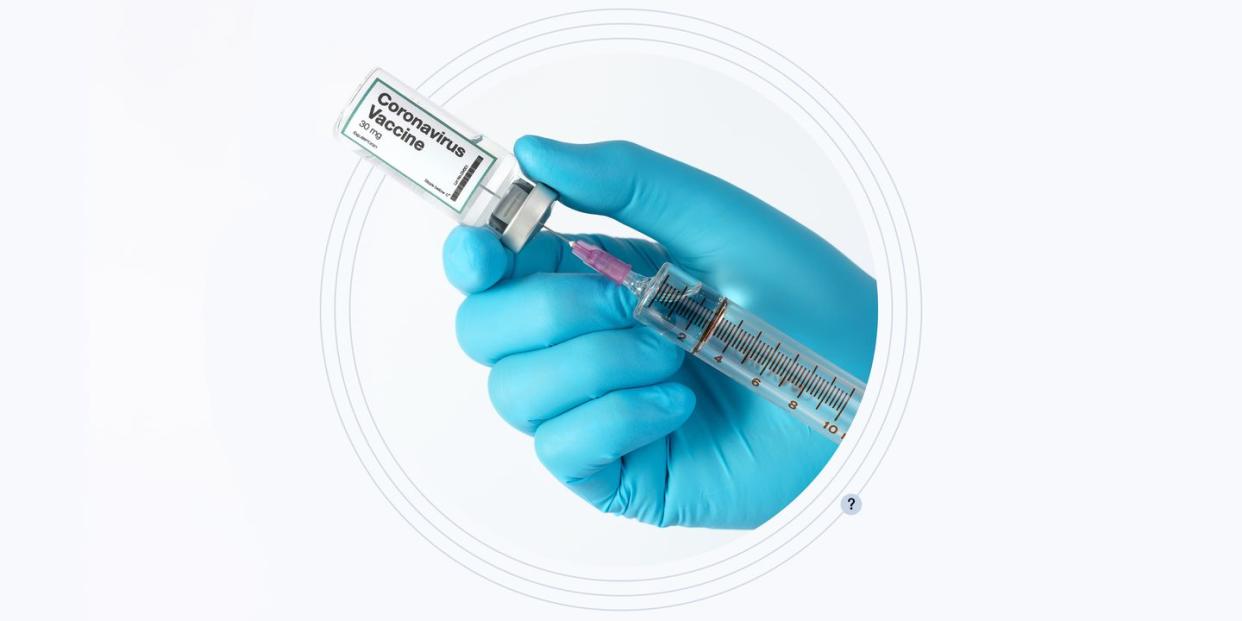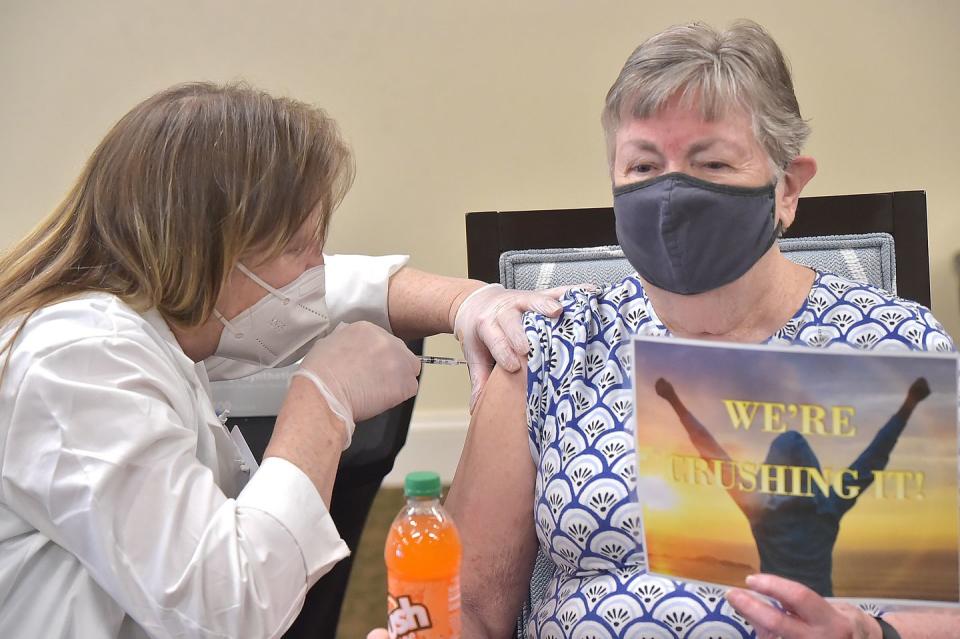Ask Dave: Is It Wrong to Take Advantage of Leftover Covid Vaccine Doses?

- Oops!Something went wrong.Please try again later.
Esquire's editor-at-large and resident (unlicensed) therapist Dave Holmes answers a question from readers. Ask Dave your own question by emailing him a askdaveholmes@gmail.com. All answers are legally binding.
Dear Dave,
In the last couple of weeks, I’ve gotten several messages from several friends, all saying roughly the same thing: “I just went to this remote community health center (or distant hospital, or distribution supersite at a local stadium) and got a leftover dose of the Covid-19 vaccine that would have gone to waste, and you should too, and here’s the info.” Of course I want to get vaccinated, but I’m not sure this is the right way to go about it. On one hand, I’d be cutting the line and taking a dose that should go to someone at higher risk, but on the other, if that untaken dose ends up in the trash can, that doesn’t help anyone either. What’s the right thing to do here?
On Needles and Pins
Dear On Needles and Pins,
This is a very important, difficult and timely question and I want to give you a thoughtful and well-reasoned answer. Unfortunately I am incapable of giving you one because I am just as antsy as everyone else to get back to a life I recognize, and anything I tell you will be influenced by that bias. I’m sure I have some kind of internal ethical compass, but I also want to get as many jabs into as many arms as possible, as fast as possible, so I can go see a Hold Steady show, and I’m not sure which force is pulling the needle the hardest. I want our most vulnerable communities to be protected from devastating illness, and I want to bellow over a Bloody Mary at brunch by May. I really wish these two desires weren’t equally strong, but that’s where we are: let’s get these vaccines out in an orderly and equitable fashion, and let’s do it yesterday.
This situation calls for an ethicist.
If I’m going to outsource, I need to aim high; not God, but close. I reached out to Fr. William Stempsey, a Jesuit priest and philosophy professor from my alma mater, the College of the Holy Cross. The Jesuits are a free-thinking order of Catholic priest, a bunch of guys who really like to savor the Big Questions. In my time at HC, I found the Jesuits to be thought-provoking, insightful and open, and in the rare moments when I wasn’t listening to Juliana Hatfield and hating myself, I learned a great deal from them. Fr. Stempsey specializes in medical ethics and moral philosophy, which fits the moment perfectly. What you and I need is a nuanced consideration of the issues. One that will lead to a firm yes or no so we don’t have to think about this anymore.
“Ethicists are always hesitant to say whether a specific thing is right or wrong,” Fr. Stempsey begins, which is a terrible early warning that I’ll have to do some of my own critical thinking here. “But the question here is: is this ethical?” Yes! Yes, here we go. “Well, I frown upon it,” damn it, “because what we’re looking at now is allocation of a scarce resource. The system is not operating terribly smoothly in a lot of places, but the allocation guidelines have been thought through carefully by committees of experts.”
Okay, right, yes. In a just and orderly world, we should choose justice and order. But we’re in 2021 and in America. Our reader is being directed toward distribution centers which find themselves with extra doses that will theoretically go to waste. Isn’t the right move to put that dose into your body, where it can move us one person closer to herd immunity, rather than into the dumpster? “Well, there’s the kicker,” Fr. Stempsey admits. “Why will it go to waste? Even if the local site that’s giving the vaccine hasn’t planned adequately, there shouldn’t be more than a few leftover doses, and they should go to someone whose group has been called. If we’re giving it to the elderly or to teachers, those doses should go to that group, and not just to whoever showed up. If the people who get the vaccine get it because they know somebody, or have the means to get themselves to the vaccination site quickly, that goes against the principle of justice that we tried to design the system to take into account.”
The problem here is a lack of resources for local health centers. I myself have a friend who rolled up to a rural clinic and got a shot just last week, no questions asked, no made-up cover story needed. And when he spoke to the staff afterward, they said they’re dying to get the word out to their community, but there’s no funding for them to do that. In an ideal world, they said they’d load up a van and go block by block through the hardest-hit neighborhoods, but if there’s no budget for flyers, a rental van is way out of reach. Like you, Needles, I can keep an ear to the ground and sneak in a shot when it suits my schedule, because my world is filled with privileged people who have the time and gas money to investigate such things, and I am Very Online. But in the communities that are hardest hit, people don’t have the time, the connections, or the internet access. A person at much higher risk might be 100 yards away from the clinic and not know to go there.
“The question is,” Fr. Stempsey continues, “are you somehow cooperating in the evil of jumping the line, and taking advantage of a privilege that the disadvantaged people that should be at the front of the line don’t have.” There is also the possibility— I am just spitballing here, and spitballing is a high-risk activity at this time— that your showing up to an underfunded health center who is less likely to turn you away, because they don’t have anyone to turn you away, might result in the opening of more pallets of more vials, leading to more unused doses at the end of the day. Chaos on top of chaos, waste on top of waste.
It is natural to be unsure of what to do here, because there is a vacuum of clear, consistent messaging. Systems of distribution vary from state to state, county to county. I’m Type 1 diabetic, which in some states is a co-morbidity that moves me up the line, but is not in the state where I live. “One state I just read has prioritized teachers over the elderly, where most states have teachers way down the line,” Fr. Stempsey says. “I think it’s New Jersey who has classified smoking as a co-morbidity and prioritized smokers over teachers. You can make arguments for and against all of these things, but different states have different systems.” And in a country that has all but snuffed out local news, you can’t be blamed for being confused.

Still, it is a step, we’re all anxious to move forward, and I want a person with moral authority to give me the justification to do the thing I already want to do. So I put it to the Jesuit priest and medical ethics professor as plainly as I can. Let’s say I’m next door to a clinic that has leftover doses that will for sure go to waste if I don’t get one: Go or no go? “When you put a question starkly like that, I can give an answer, but it’s never an adequate one. It depends so much on the particular circumstances. Why does this place have so many leftover doses at the end of a day? If that’s consistently the case, something is wrong with the operating system, in the scheduling or the inventory. If there’s a health center that’s always left with a surplus, there’s a problem upstream.” Right. Right! An audit and some harsh performance reviews are definitely in order, but what about me now? “The real hesitancy I have with saying that kind of thing is okay, is that you would now be encouraging a system wherein people can jump the line, because particular circumstances like they were lucky enough to know somebody or they got a tip.”

So the answer from the medical ethics professor is probably no but maybe but you’re going to have to figure this out for yourself and so am I. My personal ethical code leads me to conclude that if we get these tips, we have the responsibility to use our platforms, whatever their size, to get the word out. If you hear about an understaffed health clinic that is giving out doses, reach out to the people in the appropriate distribution group and let them know where to go. Help with the targeted messaging these clinics can’t do. If you have the time to make the drive, maybe roll up your sleeves to give instead of receive: see if you can’t paper a neighborhood and point some at-risk people in the right direction. And know that as eager as we all are, this particular resource will not always be this scarce: “We may not even be talking about this in another month or two when more vaccine becomes available,” he says. So if you have the privilege of working from home and avoiding high-risk human contact, as I do, sit tight.
Okay, so it’s not exactly the answer I wanted, and we are still going to have to listen to our own inner Jimmy Crickets on this one, but ultimately Fr. Stempsey’s guidance eases my overall anxiety. And though I am not in a confessional at the moment, speaking with a priest compels me to be honest. Ask Dave questions are typically from actual readers, but this one is ripped from the pages of my own life. I wrote this one myself. I am On Needles and Pins. “It’s good you told me,” Fr. Stempser says. I am forgiven. (He didn’t say that, but I’m pretty sure it’s true.)
Be safe out there. And patient.
You Might Also Like

